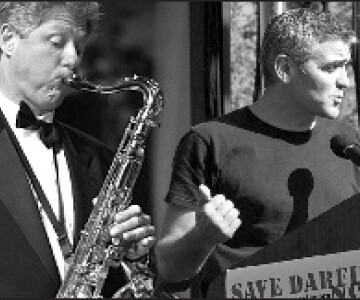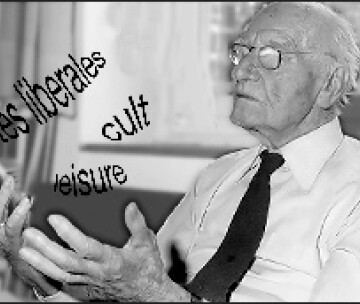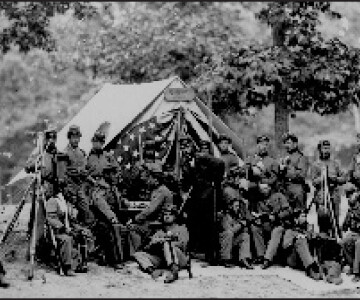The 2008 presidential contest has dominated political news for over a year, starting almost immediately after the 2006 midterm elections. Most of the coverage has devolved, as it always does, to discussion of the “horse race” among the candidates, the competition for fundraising, and an insufferably large number of debates and fora that few actual...
Category: View
What Is Wrong With Ideology?
Ideology is an intellectual pathology that has gripped the West for about three centuries. At times, we have been told that ideology is at an end. This was said after the close of World War II, when the most ideological age yet, the Cold War, was just beginning. After its collapse, some 50 years later,...
The Most Desirable Option: Reeducating for Secession
In this age when the foundational idea of American federalism has become all but defunct and the concept of states’ rights still has the whiff of Jim Crow about it, it is difficult to see how either individual states or regions can have any significant influence on the federal government—even if they had legislatures interested,...
Dobson’s Choice: Politics and the Spirit of Martyrdom
During the 1990’s, under the guidance of Rush Limbaugh and Newt Gingrich, the Christian Right learned to hate Hillary Clinton, and all her lies, and all her empty promises. To them, she is (to borrow from Dr. Sam Loomis) pure evil. She is a feminist who looks down her nose at women who stay home...
Clueless in the Congress: The Reauthorization of a Reckless Bill
The Elementary and Secondary Education Act and the No Child Left Behind Act are up for reauthorization again. This process typically entails legislators tweaking the bill—a caveat here, a zinger there. Almost always, it translates into more money. Representatives George Miller (D-CA) and Howard “Buck” McKeon (R-CA) of the Committee on Education and Labor recently...
Throne and Altar
“Whether therefore ye eat, or drink, or whatsoever ye do, do all to the glory of God” —1 Corinthians 10:31 My father, God rest his soul, was very fond of Thai food, with its quickly sautéd noodles and peppery élan. Not far from his condominium in the Rossmore section of Los Angeles, there was a...
The Conversion of a Culture: Crisis and Resolution
Can an entire culture “be converted”—i.e., turn away from entrenched patterns of selfishness and self-indulgence and replace them with patterns of altruism? Can an entire society begin to act in accordance with the Second Great Commandment, “Thou shalt love thy neighbour as thyself” (Matt. 22:39 KJV)? So fundamental a change in orientation cannot be commanded...
With Malice Toward Many: Washington, Lincoln, and God
Most Americans in the 18th, 19th, and early 20th centuries believed in the public expression of religious sentiments as surely as they believed in publicly proclaiming their patriotism. Such expression was not merely their right; it was their duty. Indeed, religious faith was part of the “given” of any political debate, the common ground upon...
At Home Abroad
The Eternal City is home to many eternal things—or, rather, their representatives, among them St. Peter’s, the Castel Sant’Angelo, the Capitoline Hill, and the Forum. Nevertheless, on recent travels to Rome, my wife’s and my first visit has been to none of these things, but, instead, to our good friends Asha and Bellamy, who reside...
Reflections on Immigration Reform
The most significant event of President George W. Bush’s second term (thus far) has been the defeat of the Comprehensive Immigration Reform Act of 2007 (S.1348). This bill was initiated by President Bush in collaboration with the Democratic congressional majority, over the opposition of the Republicans and a few rebellious Democrats. The real winners of...
Edward Abbey: Conservative Conservationist—and Controversialist
Edward Abbey never met a controversy he didn’t like. Philosopher of the barroom and the open sky, champion of wilderness, critical gadfly, fierce advocate of personal liberty, Enemy of the State writ large: For 40-odd years, Ed roamed the American West, a region, he wrote, “robbed by the cattlemen, raped by the miners, insulted by...
Planes, Trains, and Automobiles
Social conservatives have long argued that radical individualism—the essence of modern freedom—is corrosive to family and community life, and, if left unchecked, can even lead to civilizational collapse. But another, perhaps more damning, charge today is that individualism is bad for the environment. This seems paradoxical, as modern man sees himself as the quintessential environmentalist...
Agrarians, Greenies, and Goreites
Since its publication in 1930, I’ll Take My Stand has never been out of print, and each succeeding generation produces new disciples, though sometimes with a slightly different take on the original document. In recent years, some have seen in the Agrarian critique of industrial America a precursor of Al Gore’s Earth in the Balance...
Pop Culture and Politics: Passing By the Train Wreck
If Macbeth were alive today, he would probably make an appearance in the public confessional with Oprah Winfrey and, in all likelihood, would emerge as a prime candidate for Big Brother or one of the other “reality” shows that crowd our airwaves. Macbeth would be helped to come to terms with his domestic issues and...
Unification Issues in Asia: Rethinking U.S. Policy
The United States’ strategic policies toward Europe and the regions of Asia—East, South, Southeast, and Central—have often reflected the prevailing cultural ethnocentrism of most Americans, regardless of their ethnic backgrounds. For example, Europe and Asia are routinely defined as separate “continents,” even though they are obviously parts of the same land mass. Given American concerns...
In Film, the Political Is the Personal
A reporter once asked Tyrone Power if he thought his next movie would be a hit. “That depends,” Power replied, pointing to his face, “on how many close-ups of this make the final cut.” Another case of celebrity vanity? Perhaps, but I prefer to think Power was on to something essential about the nature of film. ...
GOP Country: A Troubled Marriage
Back in February, music historian J. Lester Feder published an article in the American Prospect entitled “When Country Went Right.” As Feder would have it, country music wasn’t always as “conservative” as it is today. Once upon a time, it seems, country music was a left-leaning, “populist” American art form. Then Richard Nixon, taking his...
From Wellstone to Franken: The Era of Gopher Goofiness
What happened to Minnesota—the stolid Nordic-and-German prairie republic, the mother of vice presidents, the place where Democrats were “Farmer-Labor” and seemed to mean it? Lately, when it comes to statewide office, Sven and Ole have been serving up not their usual hotdish and egg coffee but an uncharacteristic booya of Slavs and Jews, Easterners and...
It’s Hard Times, Cotton Mill Girls
Historians tend to make the same argument: The South lost the Civil War because its economy was agrarian rather than industrial, with too few munitions factories to supply Confederate troops with weapons and too few textile mills to clothe them. According to these same historians, the postbellum sharecropper system proved to be an economic disaster,...
Italy’s Push for Euthanasia: An End to “Pointless Suffering”
Thanks, in part, to the presence of the Roman Catholic Church, Italy has remained one of the least secularized countries in the European Union. At present, however, the Italian government, led by Prime Minister Romano Prodi, seems hellbent on irking the Catholic Church with its legislative initiatives, including its attempt to legalize homosexual unions and...
The Faces of Men: Education and Masculinity
This year marks the 60th anniversary of the publication of Calder Willingham’s End as a Man. Chances are, most readers today have never heard of the book, as I had not until quite recently. Despite the accolades that it received from such leading literary lights of the 1940’s as James T. Farrell (who called it...
Sex, Propaganda, and Higher Education
Over the past few years, college administrators and faculty committees have been tackling a relatively new ethical question raised on campuses across the nation: What about sex between faculty members and students? Older professors can remember when the answer to that question would have been obvious. Some can even recall a time when the question...
Wall of Sound: Noise as the Basis of Culture
“And when Joshua heard the noise of the people as they shouted, he said unto Moses, There is a noise of war in the camp.” —Exodus 32:17 Poor Phil Spector. He may be a member of the Rock and Roll Hall of Fame, the producer of a string of hits from “Be My Baby” (The...
Social Security’s War on Families
The war in Iraq has left many casualties; Social Security reform is one of them. For so long, Democrats surrounded the issue with demagoguery. And now that the Democrats control Capitol Hill, Republicans seem unwilling to acknowledge, let alone confront, Social Security’s impending financial collapse. And yet the need to confront the problem has never...
Liberality, the Basis of Culture
“ . . . redeeming the time, because the days are evil.” —Ephesians 5:15 “Go day, come day. Lord, send Sunday.” My paternal grandmother could be counted on to say these words at least once per week. Whether burdened with some mundane task or confronted with the evidence of human frailty, the prospect of the...
A Dirge for the Living
“O death, where is thy sting? O grave, where is thy victory?” —1 Corinthians 15:55 Since I am writing about death, I think I may begin with my own life. Autobiography is, after all, a kind of first-person eulogy for the living. Here is what I think is my earliest memory: “Now I lay me...
Portraits: Some Notes on the Poetry of Growing Old
Years and years ago—it would have to have been in 1958-59, a year that my wife and I and our two young children were living in Rome—I wrote a little satirical poem about famous old poets and what’s to become of them. It was occasioned by a couple of things. First, there was the arrival...
The Last Adieu: A Wake for the Living
It is not surprising that death has always been a target for comedians and satirists. After all, dying is the ultimate prat fall, an ungainly reminder to others that their time is coming. When Leo Tolstoy wanted to have a good laugh at the expense of the Russian middle class, he naturally chose a funeral...
Americans Don’t Die!
Americans do not believe in death. At least, they live as if they will never die. This has been the case from colonial times. It is a consequence of seemingly limitless opportunity and a drive for upward mobility, denied to generations of Europeans. Indentured servants, laborers, persecuted minorities, and peasants tilling the soil of the...
Tethering the Hegemon
When examining American or European views on the use of force and the role of international institutions, it is necessary to speak only of general tendencies. There are, of course, many exceptions to the overall trend on both sides of the Atlantic. Nevertheless, generally speaking, America’s longtime European allies have become increasingly alarmed at aspects...
The Business of Souls: When Experts Attack, Part II
Here’s what I can’t figure out: How in the world did Saint Patrick evangelize all of those Druid priests and clan chieftains without a mission statement? After all, history and tradition tell us that he walked around preaching and performed an occasional miracle. But how did he know what his mission was? And then, there...
Americanism, Then and Now: Our Pet Heresy
On January 22, 1899, Pope Leo XIII addressed an encyclical (Testem benevolentiae nostrae) to James Cardinal Gibbons, archbishop of Baltimore, intended “to suppress certain contentions” that had arisen in America “to the detriment of the peace of many souls.” In essence, Leo feared that some American Catholic intellectuals, including a number of bishops, were finding...
Border Math: A Study in Priorities
A rare crack in the fortified wall of the Bush administration’s diplomatic obstinacy seemed to appear as U.S. diplomats sat down in March with their Iranian and Syrian counterparts to discuss stability in Iraq. Foreign-policy realists of both parties hailed the move as a potential breakthrough: Sen. Joseph Biden (D-DE) offered a characteristically self-righteous lecture, while...
Protestantism, America, and Divine Law
Since the time of the Founding Fathers, Protestantism appeared to be the default religion in the United States. At the end of World War II, when the United States began to enjoy superpower status, Mainline Protestantism (comprising the older denominations that sprang from the Reformation) began to drift away from its moorings. Then, in the...
Of Landlords, Leases, and Calico Indians
In 1845, James Fenimore Cooper wrote Satanstoe, the first novel of The Littlepage Manuscripts, a trilogy Cooper conceived as a fictional response to the New York “anti-rent” uprising that, since 1839, had pitted leasehold tenants against their patrician landlords. It was a struggle that, in Cooper’s view, threatened the property rights enshrined in the Constitution. ...
The New Plan for Iraq
When President Bush announced, in a televised speech, that he was planning to deploy 21,500 additional troops to Iraq, he added an ominous aside: Succeeding in Iraq also requires defending its territorial integrity and stabilizing the region in the face of extremist challenges. This begins with addressing Iran and Syria. These two regimes are allowing...
Property Rights and the Founding
Americans entertain the peculiar idea that history—or, at least, “our history”—is the reign of continuity. In spite of all the talk about revolution, there appears to be a remarkable degree of stability in every substantial political rupture. The American Revolution was, in fact (we are told by historians), a “conservative one,” restoring the political order...
The War on Blight
If you live in an older section of town, this may already have happened to you. You wake up in a cold sweat. For the past 15 years, you and your husband have lovingly restored an old Victorian house. It was pretty decrepit when you started; now, it is an object of pride and beauty. ...
Where Did Our Property Rights Go?
William Pitt the Elder, in his Speech on the Excise Bill delivered before the House of Commons, encapsulated our Founding Fathers’ view of property rights when he said, “The poorest man may in his cottage bid defiance to all the force of the Crown. It may be frail; its roof may shake; the wind may...
When Experts Attack
For over 30 years, the churches of America have been declining; their numbers, plummeting. Each year, a new set of numbers emerges from the various denominational headquarters, telling the tale. The liberal Protestant Mainlines are in the worst shape, as the figures for 2006 to 2007 indicate. According to the National Council of Churches, the...
The Cardinal Vicar
“Kiss the Son, lest he be angry, and ye perish . . . ” —Psalm 2:12 Twenty-one centuries will have passed since He promised to come in His glory, 21 centuries since His prophet wrote, “Behold, I come quickly.” For centuries, then, men had beseeched Him with faith and fervor, “O Lord our God hasten...
Once Upon a Time in Hollywood
Strange as it may seem today, once upon a time, Hollywood respected Christianity. Many movies had biblical themes—some were box-office blockbusters—but, more importantly, many others had scenes depicting religion as an integral part of American culture. The public demanded it. The silver screen was full of families saying grace before a meal or attending religious...
A Strategy to Quarantine the Violence in Iraq
President Bush’s decision to send 21,500 additional troops to Iraq is a desperate attempt to salvage a mission that has gone terribly wrong. Instead of persisting in a strategy that will have U.S. forces trying to referee a multisided civil war, Washington should focus on a more achievable objective: working with Iraq’s neighbors to quarantine...
Ecrasez L’infame: The Persistence of Christophobia
Imagine a magazine that argued that the central symbol of Judaism was inextricably bound up with monstrous evil, claimed Judaism’s holy writings were lies, criticized what Jews believe and demanded they change their beliefs, attacked Judaism’s most important holidays, asserted that Judaism was directly responsible for one of the most horrific slaughters in history—and declared...
The U.N. Reform on Human Rights
Mr. Jan Eliasson, former Swedish minister of foreign affairs, is a good representative of the tradition of chivalry that Saint Bridget attributed to the Swedish people in the 14th century. From 1994 to 2000, Eliasson served as Sweden’s secretary for foreign affairs, a key position in formulating and implementing foreign policy. Earlier, he was Sweden’s...
The War on Terror Ended
Unlike some of my readers, I’m old enough to remember the time, during the American occupation of Baghdad, when this part of the city was known as the Green Zone. It was renamed the Yellow Peace Zone ten years ago, after Iraq joined the China-led Association of South-West Asian Nations (ASWAN). In fact, I’m digital-delivering...
Exiting Iraq: The Least Undesirable End
When a patient is diagnosed with lung cancer, it is tempting but not useful to harangue him on the evils of his three-pack-a-day habit. But when he refuses to kick that habit, or to accept its link with the disease, or even to acknowledge the seriousness of his condition, it is reasonable to assume that...
Reject False Prophets
In marked contrast to the optimism that the Bush administration and its supporters expressed about developments in Iraq as late as the spring of 2006, only a few diehards now deny that the security environment there is dire. When Sen. Carl Levin (D-MI) asked secretary of defense nominee Robert Gates whether the United States was...
Iraq as “Intelligence Failure”: We Told You So
“W,” a.k.a. “our Commander in Chief,” is apparently even more blindly stubborn and willfully ignorant than I had thought. As of this writing (December 2006), he is still distancing himself from the Iraq Study Group’s efforts to provide him cover for a withdrawal from the Middle East morass he has drawn us into. Bush Senior,...
Committing Political Suicide
The 109th Congress was ugly to behold. Spendthrift, irresponsible, incompetent, corrupt—like the pigs who were transformed into the farmers they had displaced in George Orwell’s Animal Farm, the Republicans ended up looking like the Democratic legislative establishment they had toppled just a dozen years before. This proved to be politically inconvenient. After all, it was...































